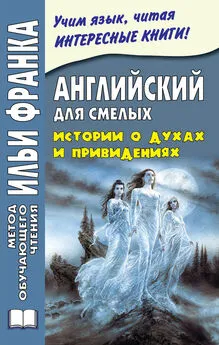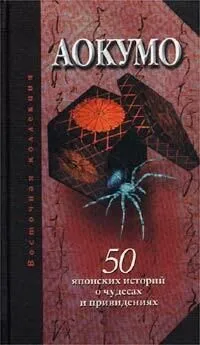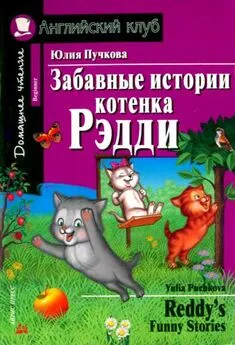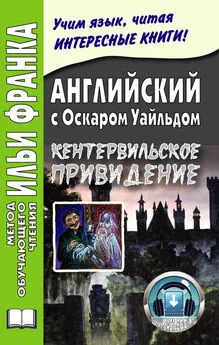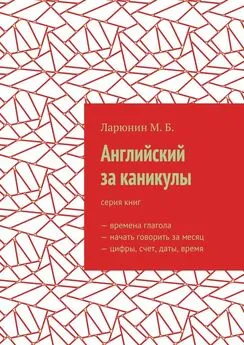Михаил Сарапов - Английский для смелых. Истории о духах и привидениях / Great Ghost Stories
- Название:Английский для смелых. Истории о духах и привидениях / Great Ghost Stories
- Автор:
- Жанр:
- Издательство:Литагент «Восточная книга»1243df63-7956-11e4-82c4-002590591ed2
- Год:2012
- Город:Москва
- ISBN:978-5-905971-42-6
- Рейтинг:
- Избранное:Добавить в избранное
-
Отзывы:
-
Ваша оценка:
Михаил Сарапов - Английский для смелых. Истории о духах и привидениях / Great Ghost Stories краткое содержание
В книгу вошли популярные мистические новеллы английских и американских авторов XIX – начала ХХ вв., от знаменитого «Дилижанса-призрака» Амалии Эдвардс до произведений признанных корифеев жанра Монтегю Родса Джеймса и Эдварда Бенсона.
Рассказы адаптированы (без упрощения текста оригинала) по методу обучающего чтения Ильи Франка. Уникальность метода заключается в том, что запоминание слов и выражений происходит за счет их повторяемости, без заучивания и необходимости использовать словарь.
Пособие способствует эффективному освоению языка, может служить дополнением к учебной программе. Предназначено для широкого круга лиц, изучающих английский язык и интересующихся английской культурой.
Английский для смелых. Истории о духах и привидениях / Great Ghost Stories - читать онлайн бесплатно ознакомительный отрывок
Интервал:
Закладка:

 Extinguishing the lamp I pulled the bed-clothing about my head and lay trembling and silent, unable to shriek, forgetful to pray. In this pitiable state I must have lain for what you call hours – with us there are no hours, there is no time.
Extinguishing the lamp I pulled the bed-clothing about my head and lay trembling and silent, unable to shriek, forgetful to pray. In this pitiable state I must have lain for what you call hours – with us there are no hours, there is no time.
At last it came – a soft, irregular sound of footfalls on the stairs! They were slow, hesitant, uncertain, as of something that did not see its way; to my disordered reason all the more terrifying for that, as the approach of some blind and mindless malevolence to which is no appeal. I even thought that I must have left the hall lamp burning and the groping of this creature proved it a monster of the night. This was foolish and inconsistent with my previous dread of the light, but what would you have? Fear has no brains; it is an idiot. The dismal witness that it bears and the cowardly counsel that it whispers are unrelated. We know this well, we who have passed into the Realm of Terror, who skulk in eternal dusk among the scenes of our former lives, invisible even to ourselves and one another, yet hiding forlorn in lonely places; yearning for speech with our loved ones, yet dumb, and as fearful of them as they of us. Sometimes the disability is removed, the law suspended: by the deathless power of love or hate we break the spell – we are seen by those whom we would warn, console, or punish. What form we seem to them to bear we know not; we know only that we terrify even those whom we most wish to comfort, and from whom we most crave tenderness and sympathy.
Forgive, I pray you, this inconsequent digression by what was once a woman(простите, умоляю вас, это сумбурное/неуместное отступление той, что когда-то была женщиной; inconsequent – нелогичный, непоследовательный / как о фактах, рассуждениях, так и о человеке / ; неуместный; не имеющий отношения к делу ) . You who consult us in this imperfect way(вы, те, кто задает нам вопросы этим несовершенным способом; to consult – советоваться; консультироваться; справляться ) – you do not understand(вы не понимаете) . You ask foolish questions about things unknown and things forbidden(вы задаете глупые вопросы о том, чего нет, и о том, о чем запрещено говорить: «о вещах неизвестных и вещах запрещенных»; to forbid ) . Much that we know and could impart in our speech is meaningless in yours(многое /из того/, что мы знаем и могли бы передать в своей речи, не имеет смысла: «бессмысленно» в вашей) . We must communicate with you through a stammering intelligence in that small fraction of our language that you yourselves can speak(мы должны общаться с вами через посредство спотыкающегося рассудка = посредством третьего лица , /пользуясь/ той небольшой частью нашего языка, что вы сами способны использовать: «на котором вы сами можете говорить»; to stammer – заикаться, говорить заикаясь; intelligence – интеллект, рассудок, разум; fraction – дробь; доля, порция, часть ) . You think that we are of another world(вы думаете, что мы живем в другом мире; to be – принадлежать, относиться ) . No, we have knowledge of no world but yours(нет, нам известен лишь ваш мир: «у нас нет знания иного мира, кроме вашего») , though for us it holds no sunlight(хотя для нас в нем нет ни солнечного света) , no warmth(ни тепла) , no music(ни музыки) , no laughter(ни смеха) , no song of birds(ни птичьих трелей) , nor any companionship(ни какого бы то ни было общения; companionship – дружеское общение, товарищеские отношения ) . O God! what a thing it is to be a ghost(о Боже, каково это – быть призраком) , cowering and shivering in an altered world(сжавшимся в комочек и дрожащим в изменившемся мире; to cower – сжиматься, съеживаться ) , a prey to apprehension and despair(жертвой мрачных предчувствий и отчаяния; apprehension – опасение; мрачное предчувствие )!

 Forgive, I pray you, this inconsequent digression by what was once a woman. You who consult us in this imperfect way – you do not understand. You ask foolish questions about things unknown and things forbidden. Much that we know and could impart in our speech is meaningless in yours. We must communicate with you through a stammering intelligence in that small fraction of our language that you yourselves can speak. You think that we are of another world. No, we have knowledge of no world but yours, though for us it holds no sunlight, no warmth, no music, no laughter, no song of birds, nor any companionship. O God! what a thing it is to be a ghost, cowering and shivering in an altered world, a prey to apprehension and despair!
Forgive, I pray you, this inconsequent digression by what was once a woman. You who consult us in this imperfect way – you do not understand. You ask foolish questions about things unknown and things forbidden. Much that we know and could impart in our speech is meaningless in yours. We must communicate with you through a stammering intelligence in that small fraction of our language that you yourselves can speak. You think that we are of another world. No, we have knowledge of no world but yours, though for us it holds no sunlight, no warmth, no music, no laughter, no song of birds, nor any companionship. O God! what a thing it is to be a ghost, cowering and shivering in an altered world, a prey to apprehension and despair!
No, I did not die of fright(нет, я не умерла от страха) : the Thing turned and went away(это нечто развернулось и ушло) . I heard it go down the stairs, hurriedly, I thought, as if itself in sudden fear(я слышала, как оно спускается по лестнице, торопливо, словно, подумала я, оно само чего-то внезапно испугалось: «во внезапном страхе») . Then I rose to call for help(затем я встала, чтобы позвать на помощь; to rise ) . Hardly had my shaking hand found the doorknob when(едва моя дрожащая рука нашла дверную ручку, как) – merciful heaven(милостивые небеса = боже милосердный) ! – I heard it returning(я услышала, как оно возвращается) . Its footfalls as it remounted the stairs were rapid, heavy and loud(его шаги, когда оно опять поднималось по лестнице, были быстрыми, тяжелыми и громкими) ; they shook the house(от них сотрясался дом; to shake ) . I fled to an angle of the wall and crouched upon the floor(я забилась в угол: «в угол стены» и съежилась на полу; to flee – убегать; искать убежища; to crouch – припадать к земле; согнуться, сжаться ) . I tried to pray(я попыталась молиться) . I tried to call the name of my dear husband(я попыталась позвать: «назвать имя» своего дорогого мужа) . Then I heard the door thrown open(затем я услышала, как распахнулась дверь; to throw open – распахивать / двери /) . There was an interval of unconsciousness(я на какое-то время потеряла сознание: «был интервал бессознательного состояния») , and when I revived I felt a strangling clutch upon my throat(и когда я очнулась, я почувствовала удушающий захват на своем горле; to revive – оживать, приходить в себя / после обморока / ; clutch – сжатие; захват ) – felt my arms feebly beating against something that bore me backward(почувствовала, как мои руки слабо молотят по чему-то, что навалилось на меня: «давит меня назад»; to beat – бить; to bear – носить, нести; нажимать, давить ) – felt my tongue thrusting itself from between my teeth(почувствовала, как мой язык вываливается изо рта: «проталкивается из-за моих зубов»; to thrust – колоть, пронзать; пролезать, протискиваться ) ! And then I passed into this life(и затем я перешла в эту жизнь).

 No, I did not die of fright: the Thing turned and went away. I heard it go down the stairs, hurriedly, I thought, as if itself in sudden fear. Then I rose to call for help. Hardly had my shaking hand found the doorknob when – merciful heaven! – I heard it returning. Its footfalls as it remounted the stairs were rapid, heavy and loud; they shook the house. I fled to an angle of the wall and crouched upon the floor. I tried to pray. I tried to call the name of my dear husband. Then I heard the door thrown open. There was an interval of unconsciousness, and when I revived I felt a strangling clutch upon my throat – felt my arms feebly beating against something that bore me backward – felt my tongue thrusting itself from between my teeth! And then I passed into this life.
No, I did not die of fright: the Thing turned and went away. I heard it go down the stairs, hurriedly, I thought, as if itself in sudden fear. Then I rose to call for help. Hardly had my shaking hand found the doorknob when – merciful heaven! – I heard it returning. Its footfalls as it remounted the stairs were rapid, heavy and loud; they shook the house. I fled to an angle of the wall and crouched upon the floor. I tried to pray. I tried to call the name of my dear husband. Then I heard the door thrown open. There was an interval of unconsciousness, and when I revived I felt a strangling clutch upon my throat – felt my arms feebly beating against something that bore me backward – felt my tongue thrusting itself from between my teeth! And then I passed into this life.
No, I have no knowledge of what it was(нет, я не знаю: «не имею знания», что это было) . The sum of what we knew at death(совокупность: «сумма» наших знаний в момент смерти; to know ) is the measure of what we know afterward of all that went before(это мера того, что мы знаем потом обо всем, что происходило раньше) . Of this existence we know many things(об этом существовании мы знаем многое) , but no new light falls upon any page of that(но новый свет не проливается ни на одну страницу прежнего существования) ; in memory is written all of it that we can read(все, что мы можем прочитать, заключено в памяти; to write – писать ) . Here are no heights of truth overlooking the confused landscape of that dubitable domain(нет здесь вершин истины, чтобы обозреть хаотичный пейзаж нашей прошлой жизни: «тех сомнительных мест»; height – высота, вышина; верхушка, вершина; domain – наследственная собственность; имение, поместье; территория, зона, область; dubitable = dudable – сомнительный, вызывающий сомнения; / лат. / dubitare – сомневаться ) . We still dwell in the Valley of the Shadow(мы по-прежнему обитаем в этой долине теней) , lurk in its desolate places(затаившись в ее уединенных уголках; desolate – одинокий, оставленный всеми, заброшенный ) , peering from brambles and thickets at its mad, malign inhabitants(из чащобы и бурелома поглядывая на ее сумасшедших злобных обитателей; to peer – зд.: вглядываться; изучать; bramble – ежевика; thicket – чаща; заросли ) . How should we have new knowledge of that fading past(откуда нам узнать что-то новое об этом ускользающем прошлом; knowledge – знание; to fade – постепенно исчезать, расплываться, блекнуть, тускнеть )?
Читать дальшеИнтервал:
Закладка:
